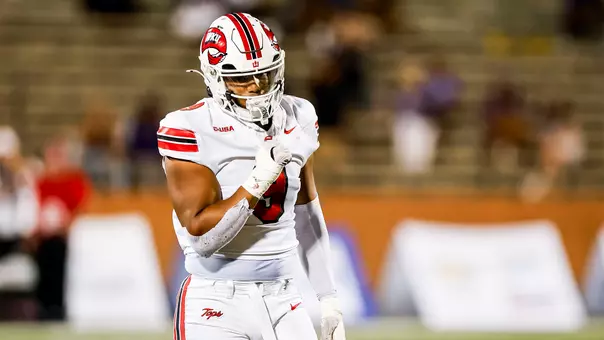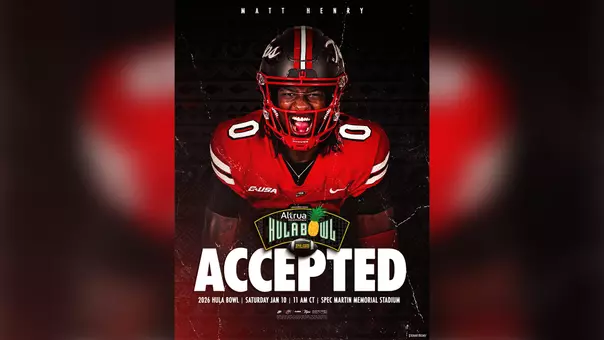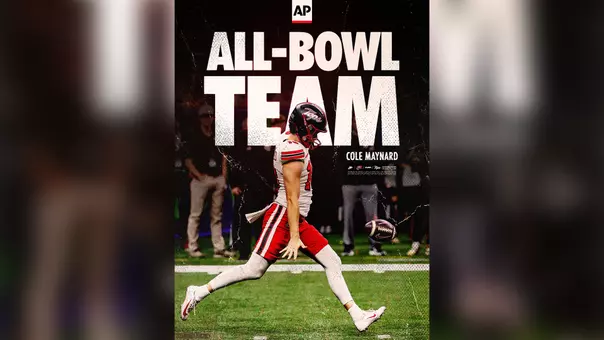That’s a question that Western Kentucky University’s Joe Dolchan and Sean Pugh can both ask as their collegiate careers near an end. Combined, the two have missed numerous games over the last three seasons. Dolchan saw both the 2004 and ’05 campaigns cut short by season-ending injuries, while Pugh’s career nearly came to a premature end after health issues last spring.
However, both have recovered and performed well on the offensive line entering WKU’s contest Saturday against Western Illinois in the Gateway Football Conference opener for both teams.
“When you have guys like Joe and Sean who do everything right, do everything you ask them to do when it comes to attitude and work ethic, and then have them suffer the unfortunate luck of injuries, it is frustrating for everyone involved,” says Hilltopper head coach David Elson. “Quite honestly, though, those two guys are the best suited, the best prepared, to handle that type of adversity. They have really served as great role models for all of our young players, because you are going to encounter adversity in your personal life after football and there’s no question that these guys have a good plan with how to deal with those issues in the future.”
For Dolchan, the obstacles have been a source of frustration. The 6-foot-3, 280-pound Dexter, Ky., native knew, dating back to his days as a standout at Calloway County High, that he was destined to play on the collegiate level. After earning all-state honors his final two seasons and all-Western Kentucky Conference accolades on three occasions, Dolchan came to the Hill even though he was recruited by Kentucky and Arkansas. “The main reason I chose to come to WKU was because I knew they had a good program,” he recalls.
He sat out as a redshirt in 2002, but made an immediate impact a year later after appearing in 10 contests both with the offense as well as the field goal/PAT special teams unit. As a sophomore, Dolchan earned the starting job at right tackle as he appeared to be on track to earn similar honors after posting an 88 percent overall grade while recording 109 knockdown blocks. However, in the Hilltoppers regular-season finale — with an NCAA Division I-AA playoff berth all but assured — he departed early in the game after hurting his left ankle. His first major injury at WKU, he missed that postseason contest at Sam Houston State but appeared to be on the right track when he returned for spring practice.
That April, though, Dolchan injured his left knee, raising concerns about whether or not he would be ready for the Toppers’ 2005 season opener. He beat the odds, though, and was able to come off the bench and contribute to WKU’s 63-3 victory over West Virginia Tech. Dolchan regained his spot in the starting lineup immediately, starting each of the next four games.
The first two injuries appeared to have little effect on his ability to handle opposing defensive ends, as he received a 92 percent overall grade while WKU was off to a 4-1 start.
Then, the unthinkable happened. Or, considering Dolchan’s history, the next event wasn’t much of a surprise.
In the week of practice leading up to the Hilltoppers’ Homecoming contest, Dolchan injured his right knee. The result was a premature end to his season for the second year in a row.
Once again proving his toughness to his teammates and others in the program, Dolchan fought past a broken left index finger that required the insertion of three screws on the first day of preseason camp last month to return to the starting lineup at Georgia Labor Day weekend. He’s seen his overall grade climb following each of the Toppers’ first three games of 2006, as he received a 90 percent mark after WKU defeated Chattanooga in its home opener last time out.
“It has definitely been hard. You need to be determined, and you need to make sure that you keep motivating yourself because when you’re injured you‘re not in the spotlight,” Dolchan says. “It’s difficult to watch everyone else go out and play when you’re on the sidelines. You feel like you‘re part of the team, but you’re really not because they are on the field doing what you would be doing except that there was a mishap.
“It is tough to deal with and it definitely takes a toll psychologically. It’s a growing process and something you need to work on every day to get past.”
Despite battling the injury bug, Dolchan has worked hard enough to become one of the Toppers’ most consistent performers on the line. “It takes time to develop into a good football player,” he says. “You will be able to learn everything you need to over several years, the difficulty with being injured frequently is you know the system but you don’t have a chance to get acclimated to it on the field. It’s almost as if you have to work twice as hard, because you know what you’re supposed to do but need to keep reteaching yourself.”
“With Joe’s injuries, it has always kind of been two steps forward and one step back,” adds Walter Wells, WKU’s offensive line coach. “Right when he gets comfortable and he understands our system as well as what opposing defenses are doing against us, he gets hurt and misses six months.
“Players need to be out on the field doing it, seeing it and experiencing it firsthand. It seems that with Joe, each year you’re starting at the same point. He’s done a great job of understanding what’s going on and working hard like Sunday night when he stayed late after practice to improve his pass protection set — his work habits have helped him get back up to speed each year, but the injuries have hindered his overall development because he’s missing out on the repetitions.”
For Pugh, the struggle dates back long before he arrived on the Hill.
At Wayne High School in Huber Heights, Ohio, he weighed in excess of 400 pounds, while in the classroom he struggled to meet the NCAA’s minimum requirement on the ACT test to be eligible as a freshman. Pugh says that the turning point came during his junior season, when the Warriors faced Upper Arlington High. In that contest, future Ohio State signee Simon Fraser overwhelmed Pugh to the point that he realized changes needed to be made.
A longtime church attendee, he decided to make a commitment then to improve himself.
“The thing about faith is that you can be raised any way, but until you have that encounter with God where you break down and realize that He’s the only way, all the other stuff doesn’t mean anything,” Pugh says. “I finally realized my junior year that I was way overweight. I had one dream — to play college football — but was being told that I was too big.
“When Simon demolished me, it was the most embarrassing moment of my life. I had a conversation with God, and He let me know that you need to love yourself first before you will be able to do that. I had low self-esteem, no confidence in myself at that point.
“Until that moment, I had been punching the clock. My mom made me get up and go to church growing up, but I didn’t want to be there. Now, I am where I am supposed to be and I love it — I thank God every night for being here.”
While schools from the Division I-A to the Division III level recruited Pugh, WKU offered a scholarship regardless of the outcome of his final test results. An appreciative Pugh returned the favor, coming to the Hill — he would go on to earn a 3.5 grade-point average his first semester.
After sitting out in 2002, assorted injuries caused Pugh to miss multiple contests each of the last three seasons. But, those wouldn’t compare with the ordeal he went through last winter prior to the start of spring practice.
During a morning workout in March, Pugh fainted. As a result, he needed to undergo numerous tests both in Bowing Green and at Vanderbilt before he would be allowed back on the field. “I didn’t know if I was going to be able to play again. This is my life,” he remembers. “I know that I am a man of God and football shouldn’t be as important as it is to me, but it is. I can’t help it.
“I received spiritual guidance from my mom, my coaches and my teammates — they all told me to keep my head up. My mom reminded me that God has a plan for you, whatever that plan is nothing is going to stop it — not your knee, not your heart, not anything else. From then on I kept high spirits because I knew that pouting wasn’t going to help — as a spiritual advisor to a lot of guys on the team, I knew that if they saw me walking with my head down, what would they think?
“There are so many guys who go through a lot more than I have. Daniel Williams lost his father right before his senior season. Entonia Johnson lost his father during his freshman year, which is probably one of your hardest years. Clay Stephens has a family, that can cause a lot of stress. I’m blessed in my situation, there’s so much more that I could be going through — the worst that could happen is not playing football again, but I knew I still had a life after that.”
He was finally cleared to return to the football field late in April. It didn’t take long to hit another bump in the road, as torn cartilage in his right knee forced Pugh to miss the annual Red-White Game.
Things have been going as well as they ever have for Pugh, though, since preseason camp opened in August. He has graded out at better than 90 percent in two of the Toppers’ first three games this season. An even bigger highlight for Pugh — who is currently listed at 6 feet and 315 pounds — came when he started WKU’s home-opening win over UTC, the first time in his career he accomplished the feat.
“It was the moment I had been waiting for. I just gave praise to God,” he recalls. “I’d be lying if I said that not starting before then was a disappointment, but I knew it had nothing to do with the coaching staff — either I would get hurt, and a lot of times the guys in front of me were just playing better.
“I’m humble to know that. The truth is the truth. I’m not blessed with a lot of athletic ability — the fact is I am short and overweight. I just thought about my family and how happy they were for me. That we won was a nice way to cap it all off.
“It was like a dream come true.”
“Sean is as consistent as one can be,” says Wells. “He has an unbelievable work ethic, he does extra conditioning to lose weight like we’ve asked him to. The most important thing is that Sean is a smart football player — he knows how to put his body in position to make the blocks he needs to make.
“He’s really come on and done a great job, especially considering the knee injury. Sean played well against Eastern Kentucky and I felt like we need to make a change. As I told him, it’s a competition each week and whoever grades out the best will be the starter.
“Sean has done a great job of taking the bull by the horns, and you can see that he doesn’t want to give it up. He enjoys starting — sometimes you forget how important it is to these kids to start. Sean always accepted his role, never whined or complained and always tried to get better. Now his opportunity has come and he has done a great job with it so far.”
Like Dolchan, Pugh’s frustrations were as much about his inability to contribute to the Hilltoppers’ success. “It’s hard because you want to play and you feel like you’re disappointing your teammates,” says Pugh. “But, my faith really got me through a lot of it. I always knew that my time would come — coming into my senior year, I started to wonder when that would happen.
“I look at everything as bumps in the road, I didn’t let all of these trials and tribulations knock me down.”
While Dolchan and Pugh’s trials and tribulations tie the story together, it’s not the only denominator the two share. Both are quiet, laid-back individuals off the field who are learning to handle an increased leadership role as fifth-year seniors. Their development in that area is crucial to the Hilltoppers, as 16 of the 19 offensive linemen on WKU’s roster will be eligible to return in 2007 — they realize it, and the coaching staff does as well.
“More than anything, a lot of guys this day and age just aren’t vocal. Kids these days keep to themselves, so we stress first and foremost to lead by example and be an extension of the coaching staff,” Elson says. “Sean can be vocal, I think he does some things off the field that most people don’t see or notice. And with Joe, I’ve had more of our players talk about how they respect him for his attitude and the way he has handled things over the years.
“They both have really set a high standard leading by example.”
“I definitely lead more by example,” says Dolchan. “Leading vocally is not my strongest suit, but I am working on it — it’s just something that I’ve never really been comfortable with. And, it’s not only on the field. I try to lead by example in the locker room and the classroom, doing things to become an adult who will be able to function in society.
“I hope that when people look at me, they say, ‘This guys is doing it right. I need to do things the way he does.’ Follow in my footsteps and everything will be OK.”
“I try to lead by example,” adds Pugh. “I’ve been limited by injuries, but whatever I do I give 100 percent — I think there is no greater way to lead than to set that example. I also try to keep a positive attitude.
“Some guys get caught up in all the work that we put in and forget that we are supposed to have fun.”
With all that Dolchan and Pugh have gone through in more than four years on the Hill, their teammates would be wise to follow their example.












